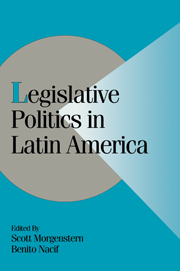Book contents
- Frontmatter
- Contents
- Tables and Figures
- Contributors
- Preface and Acknowledgments
- Party Names and Other Acronyms and Abbreviations
- 1 TOWARDS A MODEL OF LATIN AMERICAN LEGISLATURES
- Part I Executive–Legislative Relations
- Part II Political Parties and Legislative Structure
- Part III Legislatures and the Policy Process
- 10 FISCAL POLICY MAKING IN THE ARGENTINE LEGISLATURE
- 11 PROGRESSIVE AMBITION, FEDERALISM, AND PORK-BARRELING IN BRAZIL
- 12 APPOINTMENT, REELECTION, AND AUTONOMY IN THE SENATE OF CHILE
- 13 THE LEGAL AND PARTISAN FRAMEWORK OF THE LEGISLATIVE DELEGATION OF THE BUDGET IN MEXICO
- Part IV Conclusions
- References
- Author Index
- General Index
13 - THE LEGAL AND PARTISAN FRAMEWORK OF THE LEGISLATIVE DELEGATION OF THE BUDGET IN MEXICO
Published online by Cambridge University Press: 14 January 2010
- Frontmatter
- Contents
- Tables and Figures
- Contributors
- Preface and Acknowledgments
- Party Names and Other Acronyms and Abbreviations
- 1 TOWARDS A MODEL OF LATIN AMERICAN LEGISLATURES
- Part I Executive–Legislative Relations
- Part II Political Parties and Legislative Structure
- Part III Legislatures and the Policy Process
- 10 FISCAL POLICY MAKING IN THE ARGENTINE LEGISLATURE
- 11 PROGRESSIVE AMBITION, FEDERALISM, AND PORK-BARRELING IN BRAZIL
- 12 APPOINTMENT, REELECTION, AND AUTONOMY IN THE SENATE OF CHILE
- 13 THE LEGAL AND PARTISAN FRAMEWORK OF THE LEGISLATIVE DELEGATION OF THE BUDGET IN MEXICO
- Part IV Conclusions
- References
- Author Index
- General Index
Summary
The budget process in Mexico provides an excellent case study for how the party system interacts with constitutionally defined institutional relationships between the executive and legislative branches. The Constitution grants the Mexican Chamber of Deputies extraordinary powers over the budget. The Chamber has exclusive rights to approve the budget submitted by the president, and it may amend the budget. Moreover, according to the prevailing views of leading constitutional scholars, the president does not have the power to veto the budget. The outcome of the budget game in Mexico, however, does not reflect this institutional bias toward Congress. Between 1928 and 1999, the Chamber of Deputies always approved the budget sent by the president, usually without amendments, and only in the last year with amendments unacceptable to Hacienda (the finance ministry). Furthermore, the president has been delegated enormous discretion over where the money is actually spent, so that budget authorizations rarely correspond to the actual expenditures. No one in Mexico doubts that the only actor who has had any real influence over the budget is the executive. This is an emphatic result of the “metaconstitutional” powers of the Mexican presidency, powers beyond the Constitution that are derived from the partisan powers of the president.
This chapter will examine why the president enjoys greater influence over the budget than what is granted him in the Constitution. The following section will explain how each of these conditions operate and when each condition has held over the past eighty years. The next section will explain the legislative procedures for the adoption of the federal budget, and demonstrate some important differences in the three budget laws that operated during the period.
- Type
- Chapter
- Information
- Legislative Politics in Latin America , pp. 377 - 410Publisher: Cambridge University PressPrint publication year: 2002
- 16
- Cited by

